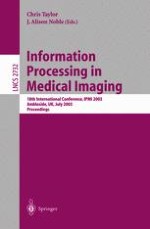2003 | OriginalPaper | Buchkapitel
Expectation Maximization Strategies for Multi-atlas Multi-label Segmentation
verfasst von : Torsten Rohlfing, Daniel B. Russakoff, Calvin R. Maurer
Erschienen in: Information Processing in Medical Imaging
Verlag: Springer Berlin Heidelberg
Enthalten in: Professional Book Archive
Aktivieren Sie unsere intelligente Suche, um passende Fachinhalte oder Patente zu finden.
Wählen Sie Textabschnitte aus um mit Künstlicher Intelligenz passenden Patente zu finden. powered by
Markieren Sie Textabschnitte, um KI-gestützt weitere passende Inhalte zu finden. powered by
It is well-known in the pattern recognition community that the accuracy of classifications obtained by combining decisions made by independent classifiers can be substantially higher that the accuracy of the individual classifiers. In order to combine multiple segmentations we introduce two extensions to an expectation maximization (EM) algorithm for ground truth estimation based on multiple experts (Warfield et al., MICCAI 2002). The first method repeatedly applies the Warfield algorithm with a subsequent integration step. The second method is a multi-label extension of the Warfield algorithm. Both extensions integrate multiple segmentations into one that is closer to the unknown ground truth than the individual segmentations. In atlas-based image segmentation, multiple classifiers arise naturally by applying different registration methods to the same atlas, or the same registration method to different atlases, or both. We perform a validation study designed to quantify the success of classifier combination methods in atlas-based segmentation. By applying random deformations, a given ground truth atlas is transformed into multiple segmentations that could result from imperfect registrations of an image to multiple atlas images. We demonstrate that a segmentation produced by combining multiple individual registration-based segmentations is more accurate for the two EM methods we propose than for simple label averaging.
